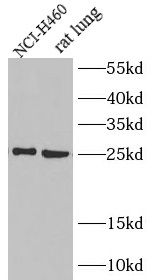Products
IL6 antibody
| Synonyms: | Interleukin-6 (IL-6)|B-cell stimulatory factor 2 (BSF-2)|CTL differentiation factor (CDF)|Hybridoma growth factor|Interferon beta-2 (IFN-beta-2)|IL6|IFNB2 antibody | ||
| Catalogue No.: | FNab04282 | Reactivity: | Human, Mouse, Rat |
| Host: | Rabbit | Tested Application: | ELISA, WB, IHC, IF |
| Clonality: | polyclonal | Isotype: | IgG |
| Size | Price |
|---|---|
| 100µg | Inquiry |
- SPECIFICATIONS
- CITATIONS
- FIGURES
- CONDITIONS
- FAQS
- Product Name
- IL6 antibody
- Catalogue No.
- FNab04282
- Size
- 100μg
- Form
- liquid
- Purification
- Immunogen affinity purified
- Purity
- ≥95% as determined by SDS-PAGE
- Clonality
- polyclonal
- Isotype
- IgG
- Storage
- PBS with 0.02% sodium azide and 50% glycerol pH 7.3, -20℃ for 12 months(Avoid repeated freeze / thaw cycles.)
- Immunogen
- interleukin 6(interferon, beta 2)
- Alternative Names
- Interleukin-6 (IL-6)|B-cell stimulatory factor 2 (BSF-2)|CTL differentiation factor (CDF)|Hybridoma growth factor|Interferon beta-2 (IFN-beta-2)|IL6|IFNB2 antibody
- UniProt ID
- P05231
- Observed MW
- 24 kDa
- Tested Applications
- ELISA, WB, IHC, IF
- Recommended dilution
- WB: 1:500-1:1000; IHC: 1:50-1:200; IF: 1:50-1:200
 Raw264.7 cells treated with LPS (100ng/ml, 8 h) and BFA (300 ng/ml, last 4 h) were subjected to SDS PAGE followed by western blot with FNab04282(IL6 antibody) at dilution of 1:1000
Raw264.7 cells treated with LPS (100ng/ml, 8 h) and BFA (300 ng/ml, last 4 h) were subjected to SDS PAGE followed by western blot with FNab04282(IL6 antibody) at dilution of 1:1000
 Immunohistochemistry of paraffin-embedded human tonsillitis tissue slide using FNab04282(IL6 Antibody) at dilution of 1:200
Immunohistochemistry of paraffin-embedded human tonsillitis tissue slide using FNab04282(IL6 Antibody) at dilution of 1:200
 Immunofluorescence analysis of RAW264.7 cells using IL-6 antibody (FNab04282) at dilution of 1:100. Blue: DAPI for nuclear staining.
Immunofluorescence analysis of RAW264.7 cells using IL-6 antibody (FNab04282) at dilution of 1:100. Blue: DAPI for nuclear staining.
- Background
- Interleukin-6(IL-6) is an interleukin that acts as both a pro-inflammatory and anti-inflammatory cytokine. IL-6 protein is secreted by a variety of cell types including T cells and macrophages as phosphorylated and variably glycosylated molecule. IL-6 Plays an essential role in the final differentiation of B-cells into Ig-secreting cells involved in lymphocyte and monocyte differentiation. It induces myeloma and plasmacytoma growth and induces nerve cells differentiation Acts on B-cells, T-cells, hepatocytes, hematopoietic progenitor cells and cells of the CNS. IL-6 is also considered a myokine, a cytokine produced from muscle, and is elevated in response to muscle contraction. IL-6 has been shown to interact with interleukin-6 receptor and glycoprotein 130. Additionally, IL-6 is involved in hematopoiesis, bone metabolism, and cancer progression, and has been defined an essential role in directing transition from innate to acquired immunity.
- Journal:
- Advanced Composites and Hybrid Materials
- Author:
- State Key Laboratory of Bio-Fibers and Eco-Textiles, Institute of Biochemical Engineering, College of Materials Science and Engineering, Qingdao University, Qingdao, 266071, China
- Cited Date:
- 2024-12-13
- Product:
- Journal:
- Probiotics and Antimicrobial Proteins
- Author:
- Department of Nephrology, Nanjing Benq Medical Center, The Affiliated Benq Hospital of Nanjing Medical University, Jiangsu, No. 71, Hexi Street, Jianye District, Nanjing, 210019, People’s Republic of China
- Cited Date:
- 2025-03-28
- Product:
- Journal:
- Journal of Advanced Veterinary and Animal Research
- Cited Date:
- 2021-01-22
- Product:
How many times can antibodies be recycled?
First, usually it's not suggested to recycle antibodies. After use, buffer system of antibodies has changed. The storage condition of recycled antibodies for different customers also varies. Thus, the performance efficiency of recycled antibodies can’t be guaranteed. Besides, FineTest ever conducted the antibody recycling assay. Assay results show recycling times of different antibodies also varies. Usually, higher antibody titer allows more repeated use. Customers can determine based on experimental requirements.
Notes: After incubation, we recycle rest antibodies to centrifuge tube and store at 4℃. High titer antibodies can be stored for a minimum of one week. Reuse about three times.
What are components of FineTest antibody buffer?
Components of FineTest antibody buffer are usually PBS with proclin300 or sodium azide, BSA, 50% glycerol. Common preservative is proclin300 or sodium azide, which is widely applied in the lab and industry.
How about the storage temperature and duration of FineTest antibodies?
Most antibodies are stored at -20℃. Directly-labeled flow cytometry antibodies should be stored at 2 - 8℃. The shelf life is one year. If after sales issues for purchased antibodies appear, return or replacement is available. Usually, antibodies can be still used after the one-year warranty. We can offer technical support services.
Is dilution required for FineTest antibodies? What’s the dilute solution?
Directly-labeled flow cytometry antibodies are ready-to-use without dilution. Other antibodies are usually concentrated. Follow the dilution ratio suggested in the manual. Dilute solution for different experiments also varies. Common antibody dilution buffers are acceptable(e.g. PBST, TBST, antibody blocking buffer).
How to retrieve antibodies for immunohistochemistry?
Common retrieval buffers: Tris-EDTA Buffer(pH 9.0); Citrate Buffer(pH 6.0)
Heat induced antibody retrieval:
Method 1: Water-bath heating: Put the beaker with retrieval buffer and slide in the boiling water bath. Keep the boiling state for 15min. Naturally cool to room temperature;
Method 2: Microwave retrieval: Put the beaker with retrieval buffer and slide in the microwave oven. Heat at high power for 5min, Switch OFF for 3min, Heat at medium power for 5min. Naturally cool to room temperature.
How to choose secondary antibodies?
(1) Secondary antibodies react with primary antibodies. Thus, secondary antibodies should be against host species of primary antibodies. E.g. If the primary antibody is derived from rabbit, the relevant secondary antibody should be against rabbit. E.g. goat anti rabbit or donkey anti rabbit.
(2) Choose secondary antibody conjugates according to the experimental type, e.g. ELISA, WB, IHC etc. Common enzyme conjugated secondary antibodies are labelled by HRP, AP etc. Fluorescin or dye labelled secondary antibodies are applied in immunofluorescence and flow cytometry(e.g. FITC, Cy3).
